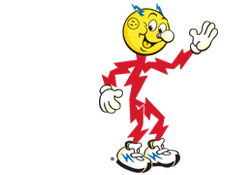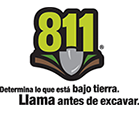Ask an Expert
Have you ever wondered why shoes hanging on a power line don’t get fried? Or why natural gas flames are blue? Now you can get answers to these and all your energy-related questions. Just Ask an Expert!
The Expert answers new questions regularly, so check back to see if YOUR question is up!
Click Here to Ask a New Question
Click on a question below to see the answer:
NEW! Why do shoes hang from power lines?
—Rob
Answer: People may throw shoes up on a power line because they think it’s clever or fun and they may not realize the shoes create a dangerous situation. If the shoes touch two power lines at the same time, or if they touch a power line and a power pole at the same time, they could start a fire. And anyone who tries to get the shoes down could be seriously shocked or even killed. So if you ever see someone throwing shoes up onto a power line, tell them to stop! And please call Xcel Energy to report any shoes you see hanging from power lines in your neighborhood.
NEW! How many electrons are in this world?
—Anonymous
Answer: Let’s start with a period at the end of a sentence on a typical printed page. There are 7.5 trillion atoms in that period, and each atom contains at least one electron. Now imagine all the electrons in all the atoms in all the periods at the end of all the sentences on all the printed pages on earth—and all the atoms in everything else on earth as well. You will find that the number of electrons in this world is too big to count—and maybe even too big to imagine!
NEW! Why are some power lines smaller than others?
—Rob
Answer: Power lines are designed differently based on the amount of voltage, or pressure, of the electricity they carry. Thicker power lines typically carry higher-voltage electricity, and thinner power lines typically carry lower-voltage electricity. But no matter their size, all power lines are dangerous to contact—so always stay far away from them!
What are different kinds of energy?
What is energy?
—Larry
Answer: Some other students asked these questions a short while ago. Please see my responses to them below.
When you drive a car, are you using kinetic energy or potential energy?
—Sophie
Answer: When you turn on the ignition of a car and start driving, you turn the potential energy stored as gasoline in the car into kinetic energy, the energy of motion. When you go downhill in a car, gravitational potential energy helps you along.
What is the best energy to use?
—Ryan
Answer: There is no “best” energy to use. Each type has its advantages and drawbacks. Xcel Energy relies on a mix of different types of energy sources to generate the electricity that we use in our homes. Nonrenewable energy sources such as coal, oil, and natural gas are lower in cost but will ultimately run out (that’s why they’re called nonrenewable), and may have more of an impact on the environment than renewable energy sources such as solar, wind, hydro, and geothermal energy. But renewable energy sources may be less available depending on your geographic location, and they can be more expensive.
How would you build an Energy Efficient Building?
—Kaylin
Answer: The principal feature of an energy-efficient building is that it uses energy resources more efficiently than a standard building. So you would need to install well-insulated floors, walls, and attic ceilings and high-performance windows, all of which would help keep heat in during winter and out during summer. The home should be tightly sealed to reduce drafts and energy leaks. An energy-efficient building should also have efficient heating and cooling systems and energy-efficient lighting, water heater, and appliances.
What’s energy?
—Oliver, Tanner, Robert
What are all the different kinds of energy?
—Liza, Kaylin, Robert, Jackson
How does energy work, and what type of energy is there?
—Kali, Caden
Answer: Some of your questions are connected so I’m going to answer them together. Energy is the ability to do work of one sort or another. This could be throwing a ball, lighting up the sky like lightning does, digesting food, or creating heat in a fireplace. Each of these types of “work” constitutes one of the different types of energy, which are mechanical, electrical, radiant, chemical, thermal, and nuclear.





